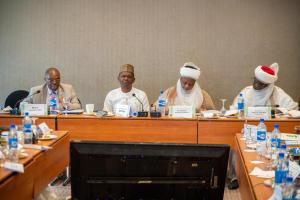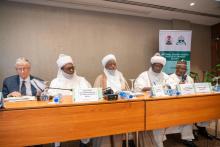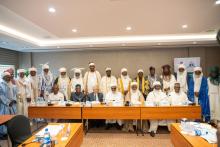Government, Partners, and Northern Traditional Leaders Reaffirm Commitment to Nigeria’s Immunisation and Health Services Goals
Abuja, 9 September, 2024 -- The World Health Organization Country Representative in Nigeria (WR), Dr Walter Kazadi Mulombo, has reaffirmed the organisation's unrelenting commitment to supporting the government of Nigeria to achieve its goal of stopping all forms of polio transmission and strengthening routine immunisation while building a resilient healthcare system across the country.
Dr Mulombo's remarks came during the Northern Traditional Leaders' Committee (NTLC) on Primary Health Care Service Delivery quarterly review meeting in Abuja, organised by the National Primary Health Care Development Agency (NPHCDA).
During the strategic meeting, Dr Mulombo appreciated the critical historical role of the traditional and religious leaders in ensuring Nigeria eradicates all forms of poliovirus.
Urging them not to relent in their effort, he said, "The committee has the most critical framework with the necessary resources to put a stop to the transmission of the Circulating Variant poliovirus Type 2 (cVPV2) as well as improve the overall Primary Healthcare (PHC) Service delivery and ultimately achieve Universal Health Coverage for Nigerians.
Appreciating the government for providing an environment that enables the NTLC's functionality, he added that the WHO would continue to support the country in building its health workforce's capacity to create a resilient health system.
He also stated that with the recently affirmed Local Government Authority (LGA)autonomy, WHO has already initiated engagement with the Amalgamation of Local Government of Nigeria (ALGON) leadership on health system strengthening (HSS) and human resource for health (HRH).
WHO has been supporting Nigeria in its fight against all forms of poliovirus through strengthening immunisation campaigns and building the capacity of its health workforce to build a resilient health system.
Critical Role of Vaccines in Combating Diseases
In an earlier remark, the Coordinating Minister of Health and Social Welfare, Professor Muhammad Ali Pate, emphasised the critical role vaccines have played in combating diseases, particularly in the face of challenges posed by misinformation and the influence of social media.
He also highlighted that the role played by the traditional and religious leaders in safeguarding the communities' health and well-being over the years cannot be overstated.
"Over the past 15 years, the NTLC has been instrumental in advancing efforts to expand immunisation and transform primary healthcare in Nigeria. One of Nigeria's key achievements in recent years is the successful eradication of the wild poliovirus.
The Minister said there are viruses, if not controlled, that can be exported, and Nigeria would not like to be in that position. He, therefore, urged the traditional leaders with communities sharing international borders with other countries to prepare for a campaign in October so that Nigeria can have the best possible immunisation campaign,
In parallel, the Minister appreciated the roles of development partners and non-governmental organisations, including Mr Bill Gates, Aliko Dangote, WHO, and others, for supporting the government and NTLC.
Recognition of Progress and the Call for Continued Support
In his goodwill message, the Co-founder of the Bill and Melinda Gates Foundation, Mr Gates, also appreciated the NTLC and the level of progress made in the fight against polio in the country despite challenges of anti-polio sentiments and insecurity.
While appreciating Nigeria's effort to maintain a wild polio-free status despite the numerous challenges, he commended 86% coverage achieved for the HPV campaign, describing it as one of the best globally.
In their remarks, the Emir of Arugungu, who is also the Chairman of the NTLC on polio eradication, and the Sultan of Sokoto, Muhammadu Sa'ad Abubakar, reiterated their strong commitment to this cause, saying that NTLC will not rest until every eligible child are reached with the polio vaccine, routine immunisation and quality healthcare services.
They also called on Mr Gates and partners to support the NTLC with additional funding and for the Minister of Health to continue to provide the enabling environment for the NTLC to function more efficiently.
Traditional Leaders at the Forefront of Public Health Interventions
In Nigeria, achieving success in public health interventions demands trust, community engagement and culturally tailored strategies, and the northern traditional and religious leaders have been at the forefront of the effort to drive successful implementations of vaccination campaigns and health education initiatives for disease prevention measures.
The committee is pivotal in improving maternal and child health by advocating for safe childbirth practices and promoting access to prenatal and postnatal care. These efforts have led to healthier outcomes for mothers and children.
Also, the committee's advocacy has enhanced routine immunisation coverage, especially in remote and underserved areas. However, there is still much work to be done to reduce the number of zero-dose children.





